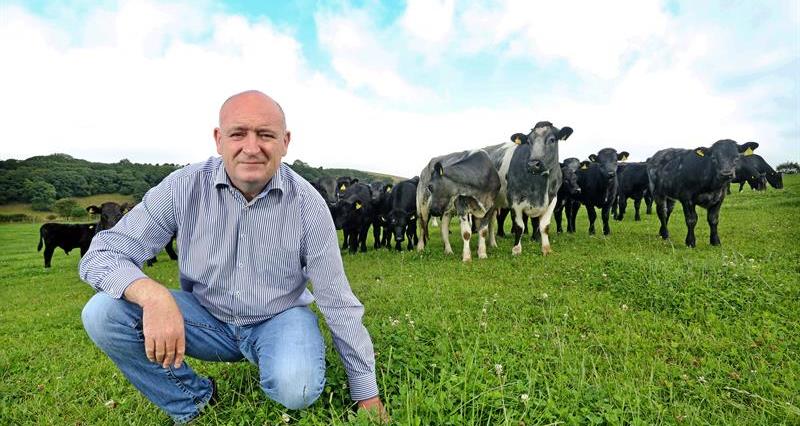- Welsh Government's Refreshed TB Eradication Programme consultation
- Read our seven-page summary of the Welsh Government's Refreshed TB Eradication Programme.
NFU Cymru says that while a 48% decrease in new TB incidents since 2009 is welcome, the fact that 98,640 cattle were slaughtered as a result of bovine TB between 2010-2020 inclusive - and 10,700 over the past 12 months - is inescapable proof that the disease continues to cast a dark cloud over the Welsh cattle industry. The union states that the disease remains one of the main barriers to the Welsh agricultural industry realising its aspirations and potential.
Following the Minister’s statement, NFU Cymru has also expressed that its members will be extremely concerned over some of the options put forward for consideration around compensation. The union categorically rejects any move to tabular valuations.
Mae diciau yn parhau i roi pwysau enfawr ar deuluoedd ffermio Cymru.
— NFU Cymru 🚜 (@NFUCymru) November 23, 2021
Bovine TB continues to put huge pressure on Welsh farming families.
Our County Adviser Peter Howells highlighted our concerns in a recent interview with @Ffermio⤵️
👉https://t.co/g09ukeKaUd pic.twitter.com/VL2MQSMoEK
Emotional and mental anguish
NFU Cymru President John Davies said: “Bovine TB is a horrendous disease that causes untold emotional and mental anguish for farming families. Farming businesses under bovine TB restrictions suffer significant financial pressures as a result of the constraints on trading and consequential losses associated with this disease being on farm. The fact that almost 100,000 cattle have been slaughtered in a little over 10 years is a shocking statistic. Our members remain deeply frustrated that the ability to tackle and get on top of this disease has, for so many years, been hampered by the fact that Welsh Government policy measures see politics, all too often, override the science.
“NFU Cymru recognises that different approaches are appropriate in different parts of Wales and for this reason we have been supportive of the regionalised approach adopted by Welsh Government since 2017. We agree that in areas of Wales where the disease is not endemic, then the focus of all our actions has to be to keep it out through stringent cattle measures.
New veterinary facilities in Wales
“We agree that there is a need to consider the opportunities that new tests and diagnostics could play in helping farmers and vets to be able to manage a herd breakdown to help ensure the herd is released from restrictions as soon as possible. It is encouraging to see here in Wales the new veterinary facilities at Aberystwyth University are already beginning to have an influence.
“In June 2017 Welsh Government introduced the trap and test approach for badgers on some farms experiencing persistent herd breakdowns. We welcomed that announcement as a step forward towards TB eradication in Wales. Today’s announcement that this will be phased out is clearly a major step backwards in progress towards eradication. We are deeply frustrated that Welsh Government refuses to learn the lessons from England, and all the other countries in the world, who have successfully tackled this disease through a comprehensive TB eradication strategy. Welsh Government appears to be unique in its thinking that this disease can be eradicated without proactively dealing with diseased animals in both cattle and wildlife populations.
Compensation arrangements
“Farmers will be extremely concerned to read the options put forward by Welsh Government with regards to compensation arrangements. NFU Cymru categorically rejects any move to tabular valuations. NFU Cymru’s firm view is that compensation arrangements must reflect the value of the animal’s individual merits, and this can only be achieved via an individual valuation. The payment of compensation for a TB reactor does not in any way cover the consequential losses (the loss of production, inability to market produce, increased housing and feeding costs etc.) sustained by the business as the result of a TB breakdown.
“Welsh Government suggests the review is brought upon by overspend of the budget. We are absolutely clear that the only way to reduce any overspend that government may have is to ensure that the disease is controlled quickly and effectively so that the disease has the smallest possible impact on the national herd. The fewer animals that need to be slaughtered as a result of bovine TB, the lower the compensation bill and the lower the cost for both Government and industry.
Development of EID Cymru
“We believe that the development of EID Cymru to include a cattle element could play an important role with regards to informed purchasing, giving potential purchasers of cattle information on the TB testing history of that animal prior to purchase.
“An issue that comes up time and time again is the poor communication between farmers and government with regards to bovine TB. We will consider carefully the proposals put forward by Welsh Government to address this issue. Most importantly, we believe it is absolutely vital the farmer’s own vet has a far greater input into the management of the TB breakdown.
“We will now spend some time to digest the information published today and consult with our members on a number of matters raised within the statement and within the consultation.”
Summary of the Welsh Government's Refreshed TB Eradication Programme
